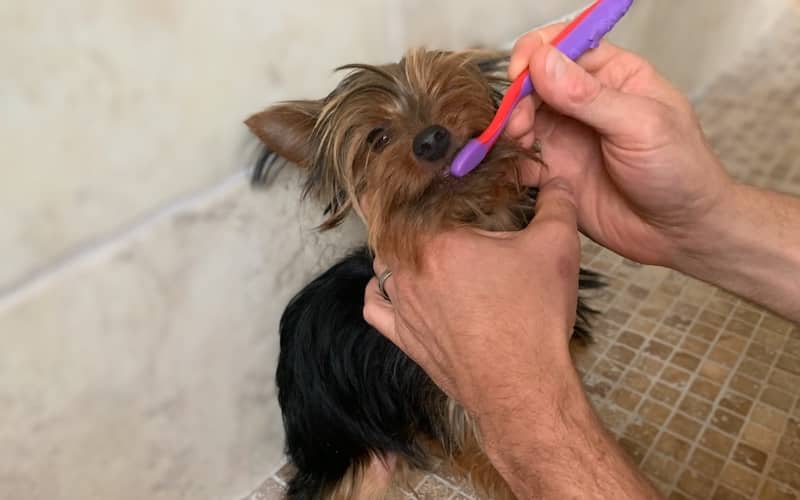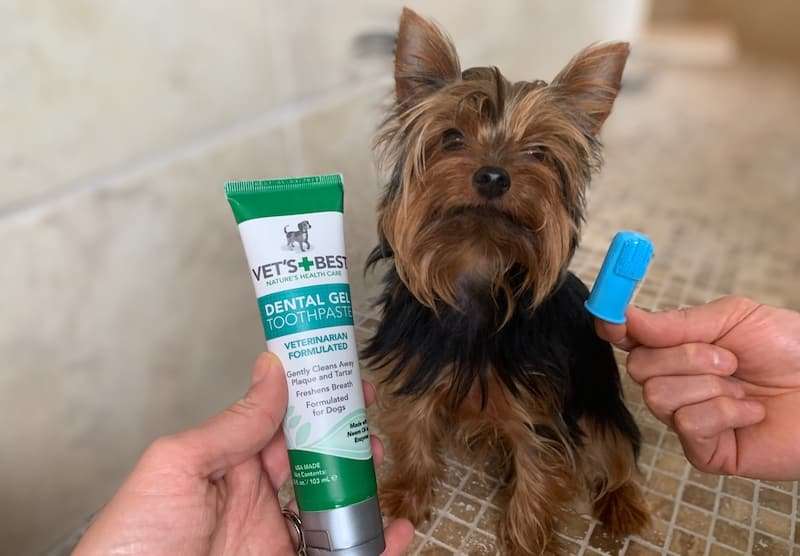The Dog Tale is reader-supported. We may earn a commission if you buy something through our site; this doesn’t change our recommendations.
Nobody likes getting their teeth worked on, but dental visits are an unfortunate fact of life. And regrettably, this is true for your Yorkie as much as it is for you. Periodontal disease affects more than 75% of dogs and is associated with serious health issues far beyond your dog’s mouth.1 In addition to pain, difficulty eating, cosmetic damage, and even jaw fractures, poor dental hygiene can lead to inflammation of your dog’s internal organs.
“The primary other health concerns from periodontal disease include the kidneys and lungs,” says Dr. Steven Thompson, DVM, DABVP, and clinical associate professor at the Purdue University College of Veterinary Medicine. “Initial inflammation leads to scarring and fibrosis.”
If your Yorkie puppy is losing teeth, you probably don’t need to be alarmed. But if you notice especially stinky breath, difficulty eating, and loose or missing teeth in an adult Yorkie, something may be wrong.
In this guide:
- Common questions about Yorkshire Terrier teeth
- Reasons your Yorkie’s teeth may be falling out
- Brushing & dental care instructions
- Protect your pet in seconds
- Accident & Illness + Optional Wellness coverage available
- Policies start at just $9.99/mo
Common questions about Yorkie teeth
Do Yorkies have problems with their teeth?
Yes. Although dental disease is a common issue for many dogs, the Yorkie dog breed is thought to be predisposed to having bad teeth. This is due in part to the fact that Yorkies have such tiny jaws, which can lead to overcrowded teeth.
Having overcrowded teeth means more food will get stuck between the teeth, which leads to increased buildup of plaque, tartar, and eventual gum disease. Regular brushing at home and cleanings at the vet are necessary to avoid this buildup and to prevent unnecessary tooth extractions.
A common sign that your Yorkie is developing teeth issues is halitosis, or in laymen’s terms: Yorkie bad breath.
“I see many Yorkie owners that just accept that halitosis is a given and [dental visits] always include extractions,” said Thompson. A beagle owner himself, Thompson does not believe such a casual approach to canine dental health is acceptable. His dog is just 4 years old but has already had three cleanings under anesthesia and no extractions have been necessary.
How many teeth do Yorkies have?
Adult Yorkshire Terriers should have 42 permanent teeth. However, the adult teeth sometimes come in beside, rather than behind, the baby teeth, leading to the dog retaining extra teeth in the mouth.
What if my Yorkie’s baby teeth are not falling out?
If your Yorkie’s baby teeth do not fall out on schedule (more on this below), you may need to have them pulled in order to prevent the overcrowding and the resulting deterioration described below. Ask your vet about it during your next visit.
- Unlimited consultations by video/text
- $3,000/year emergency fund + Rx discounts
- Cover up to 6 pets for just $24/month
- Try it FREE for 7 days
Reasons your Yorkie’s teeth may be falling out
There are several reasons your Yorkie’s teeth may be loose or falling out. Some are perfectly natural, while others are cause for concern.
Normal puppy teething
Yorkie puppies are born without teeth since they exclusively eat milk provided by their mother for the first several weeks of their lives. But once the puppy is about 3 weeks old, they will begin growing their deciduous puppy teeth. These are sometimes called “baby teeth” or “milk teeth.”
A Yorkie’s puppy teeth should grow in over the next 5 to 6 weeks and will serve them until Yorkie teething begins at about 4 months of age. At this point, the pup will begin replacing its milk teeth with permanent teeth.
When do Yorkie puppy teeth fall out?
The Yorkshire Terrier teething age is between 4 and 8 months old. Puppy teeth will grow loose and fall out as the dog’s permanent teeth push them out from behind. If your Yorkie’s teeth do not fall out, it can cause significant problems.
If, for example, your 5-year-old or 10-year-old Yorkie is losing teeth, that is likely a sign of dental disease, and you should see a veterinarian.
>> Read more: Yorkie Growth Chart: How Big Will My Yorkie Get?
Adult Yorkie teeth problems
Although the loss of puppy teeth is natural and important, an adult Yorkie that loses its permanent teeth is likely suffering from some form of dental issue.
Yorkie tooth decay
Yorkie tooth decay starts with the everyday buildup of plaque and tartar. Dogs need to have their teeth regularly brushed and occasionally scraped to prevent such buildup, but other factors, such as overcrowded teeth, can also lead to decay.
Yorkies are especially prone to this issue due to their tiny jaws. If an extra set of teeth grows in or baby teeth fail to fall out, food will get stuck between the teeth more often and lead to more decay.
>> Get reimbursed for an annual dental cleaning with Lemonade Pet Insurance
Yorkie gum disease
If you don’t regularly clean your Yorkie’s teeth and allow decay to set in, it will eventually spread to the gums. Yorkie gum disease can lead to painful, inflamed gums and loose teeth.
But gum disease isn’t just bad for your dog’s dental health; it can also prevent your pup from eating well, a bad outcome for Yorkies, which are already predisposed to hypoglycemia.
It’s also believed that dental disease may lead to damage to the heart, liver, and kidneys, although this hasn’t been thoroughly tested.1
Signs of periodontal disease in Yorkies
- Bad breath (halitosis)
- Trouble eating or holding items in the mouth
- Loose teeth
- Inflamed gums
- Aggression or defensiveness if you touch near the mouth
Yorkie teeth cleaning & dental care
Keeping your Yorkie’s teeth clean is imperative for preventing rotten teeth, tooth loss, and dental disease. This will require both regular brushing at home and periodical cleaning at the vet’s office.
How to brush Yorkie teeth

1. Get your Yorkie comfortable with the process
The first step in brushing your Yorkie’s teeth is to get them comfortable with you sticking your fingers near and inside their mouth. It’s important to start this early in life; if you put it off until your dog is 2 or 3 years old (when dental issues may become more apparent), they probably won’t cooperate.
Even if your Yorkie still has their baby teeth, condition them by putting your fingers against their mouth. Gently lift their lip to expose their teeth and calm them if they squirm. Do this several times a day for a few days.
Once your pup is comfortable with you exposing their teeth, gently open their jaw. They’ll likely object to this, so hold their head and muzzle steady without using too much force. Once your pup calms down, try again until you’re able to run your finger along their teeth, mimicking the motion you’ll use when brushing.
You’ll have to repeat this process over several days to get your dog used to the routine. It may help to dip your finger in something tasty but liquid, such as broth, so your pup is more receptive. And after you’re done, make sure you reward them with a treat.
If you do this consistently when your Yorkie is young, you’ll make brushing their teeth easier later in life.
2. Get the right equipment
As you’re conditioning your dog to have their teeth brushed, get the equipment you’ll need to keep their teeth cleaned. Take note: you cannot use human toothpaste or your old toothbrush to keep your dog’s teeth clean.
Human toothbrushes are often too coarse for a dog’s gums and too large for a breed as small as the Yorkshire Terrier. Likewise, human toothpaste is made with ingredients toxic to dogs when swallowed, such as xylitol and fluoride.2
Instead, grab a dental care kit for puppies or small dog breeds, such as Vet’s Best Dental Care Kit. You can also check out our DIY guide on how to make homemade dog toothpaste. You’ll want to use the finger brush when you first get started, then graduate to a standard or double-sided brush when your dog gets more comfortable with the routine.
If your dog really has a hard time accepting the brush, you can consider switching to a chicken-flavored toothpaste. Dogs love it, and it will work just as well to keep their teeth clean; it just won’t smell quite as fresh for you.
3. Introduce your Yorkie to the brush & toothpaste
The first time you try to brush your Yorkie’s teeth, you’ll want to take it slow. First, let them inspect the brush on their own. Put it near their mouth and let them give it a sniff and a lick. Next, put a small amount of dog-friendly toothpaste on the brush and place your palm over the bridge of their nose.
Lift their lip and begin brushing the outside of the teeth. Your pup will want to have a lick of whatever it is you’re scrubbing their mouth with, so take a break and give them a treat for good behavior so far. If this is as far as you get the first couple of times you attempt brushing their teeth, that’s okay.
4. Brush the inside of the mouth
Sooner or later, you’ll need to tackle the inside of the mouth. Calm your dog and gently open their jaw, just like you practiced. Then, beginning in the front, start to brush the tops and insides of your dog’s teeth. You’ll probably need to brush for a few seconds, then take a break to praise your dog before brushing again. Repeat until the insides of the teeth have been totally brushed.
The back of the mouth will be the hardest to reach, but you can’t neglect that area. If you find your Yorkie’s mouth is too small to reach the back, you may need a smaller toothbrush.
And if your dog throws a fit every time you grab the toothbrush, it’s okay to alternate between the inside and outside of the teeth every other time you brush.
5. Reward your dog with a dental treat
Positive reinforcement is crucial for helping dogs adapt to new routines. After each brushing, give your Yorkie a dental treat for a job well done. One of our favorites for Yorkies is Greenies Teenie Natural Dental Dog Treats, but you can review our guide to the best dog treats for Yorkies for more options.
Apart from treats, you should also give your dog chew toys designed to clean their teeth. These toys have soft rubber nubs and ridges to get in between your Yorkie’s teeth and rub away any plaque and food particles. Just make sure to get one designed for a small breed, such as Hartz’ Chew ‘n Clean toy.
How often should I brush my Yorkie’s teeth?
You should brush your Yorkie’s teeth every day. Try incorporating it into your nightly routine, such as when you watch TV. Your pup will get used to it and may even enjoy the attention. Additionally, make sure several of the chew toys you give your pet are designed to clean their teeth. If your dog eats wet food instead of dry food, brushing becomes even more important.
>> Read more: Best Dog Food for Dogs With Bad Teeth
Get professional cleaning performed by a vet
Although brushing your Yorkie’s teeth will go a long way toward preventing the buildup of plaque and tartar, it isn’t enough. “Even daily brushing does not preclude the need for anesthetized oral exams, radiographs, and therapy, the same as in human dental care,” says the AAHA Dental Guidelines.3
When you brush your Yorkie’s teeth, you scrub away the food and plaque that has the potential to turn into tartar. But once it’s calcified, you’ll have difficulty removing it yourself. A veterinarian will be able to scrape your Yorkie’s teeth and clean beneath the gums to keep dental disease in check. They’ll also be able to take X-rays that may reveal decay not visible to the naked eye.
“Most Yorkies will need an anesthetized oral exam twice yearly,” says Thompson. This may sound expensive, but just like your own dental cleanings, regular examinations will help prevent more costly procedures down the line.
At a minimum, try to get your Yorkie’s teeth examined and cleaned at least once every year. “Extending beyond 12–15 months typically will reveal advanced periodontal disease progression [requiring] multiple oral surgeries and extractions,” Thompson says.
If your dog will need a dental exam in the near future, now’s a great time to look into a pet insurance policy that includes the option for dental care reimbursements, like Lemonade Pet Insurance.
Yorkie Allergies: What Are Yorkies Allergic To?
Let's bark a little
Get our latest updates and articles right in your email.
We won't bark too much. Promise.
References
- Glickman, L., Glickman, N., Moore G., Lund, E., Lantz, G., Pressler, B., “Associate Between Chronic Azotemid Kidney Disease and the Severity of Periodontal Disease in Dogs” https://pubmed.ncbi.nlm.nih.gov/21345505/
- Ranjan, Rakesh & Ranjan, Amita. (2015). Fluoride Toxicity in Animals. 10.1007/978-3-319-17512-6. https://www.researchgate.net/publication/280826678_Fluoride_Toxicity_in_Animals
- 2019 AAHA Dental Care Guidelines for Dogs and Cats https://www.aaha.org/aaha-guidelines/dental-care/overview/



